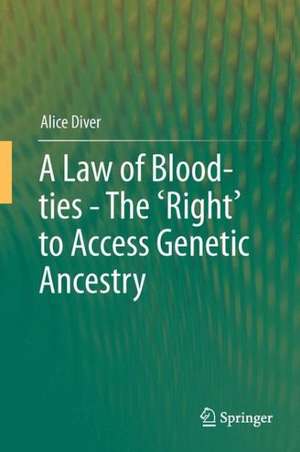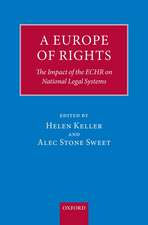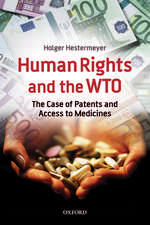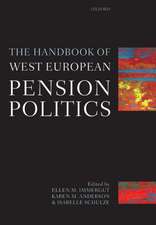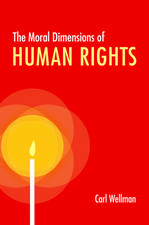A Law of Blood-ties - The 'Right' to Access Genetic Ancestry
Autor Alice Diveren Limba Engleză Hardback – 12 sep 2013
| Toate formatele și edițiile | Preț | Express |
|---|---|---|
| Paperback (1) | 641.71 lei 6-8 săpt. | |
| Springer International Publishing – 23 aug 2015 | 641.71 lei 6-8 săpt. | |
| Hardback (1) | 647.92 lei 6-8 săpt. | |
| Springer International Publishing – 12 sep 2013 | 647.92 lei 6-8 săpt. |
Preț: 647.92 lei
Preț vechi: 762.26 lei
-15% Nou
Puncte Express: 972
Preț estimativ în valută:
123.98€ • 129.88$ • 102.75£
123.98€ • 129.88$ • 102.75£
Carte tipărită la comandă
Livrare economică 08-22 aprilie
Preluare comenzi: 021 569.72.76
Specificații
ISBN-13: 9783319010700
ISBN-10: 3319010700
Pagini: 450
Ilustrații: XIII, 306 p.
Dimensiuni: 155 x 235 x 25 mm
Greutate: 0.63 kg
Ediția:2014
Editura: Springer International Publishing
Colecția Springer
Locul publicării:Cham, Switzerland
ISBN-10: 3319010700
Pagini: 450
Ilustrații: XIII, 306 p.
Dimensiuni: 155 x 235 x 25 mm
Greutate: 0.63 kg
Ediția:2014
Editura: Springer International Publishing
Colecția Springer
Locul publicării:Cham, Switzerland
Public țintă
ResearchCuprins
Introduction.- The Blood-tie as Socio-cultural 'Item': Ancestry Feared and Revered.- The Blood-tie: 'Properly Locked Drawers' and a 'Doomed Quality'.- Conceptualizing the "Right" to Avoid Origin Deprivation: International Law and Domestic Implementation.- Strasbourg Jurisprudence: 'Remembered Relatedness'.- Never Knowing 'One's Past': Genetic Ancestry Vetoes as Discrimination?.- 'Related' Matters in an Open Records Region: Relinquishment, Contact and Best Interests.- Blood-tie Preservation as Paramount: Best Interests of Child Outweighed?.- Guiding Principles, Hard Cases.- Conclusion: Preventing Origin Deprivation.
Textul de pe ultima copertă
This text collates and examines the jurisprudence that currently exists in respect of blood-tied genetic connection, arguing that the right to identity often rests upon the ability to identify biological ancestors, which in turn requires an absence of adult-centric veto norms. It looks firstly to the nature and purpose of the blood-tie as a unique item of birthright heritage, whose socio-cultural value perhaps lies mainly in preventing, or perhaps engendering, a feared or revered sense of ‘otherness.’ It then traces the evolution of the various policies on ‘telling’ and accessing truth, tying these to the diverse body of psychological theories on the need for unbroken attachments and the harms of being origin deprived. The ‘law’ of the blood-tie comprises of several overlapping and sometimes conflicting strands: the international law provisions and UNCRC Country Reports on the child’s right to identity, recent Strasbourg case law, and domestic case law from a number of jurisdictions on issues such as legal parentage, vetoes on post-adoption contact, court-delegated decision-making, overturned placements and the best interests of the relinquished child. The text also suggests a means of preventing the discriminatory effects of denied ancestry, calling upon domestic jurists, legislators, policy-makers and parents to be mindful of the long-term effects of genetic ‘kinlessness’ upon origin deprived persons, especially where they have been tasked with protecting this vulnerable section of the population.
Caracteristici
Collates and analyses current law and policies on the right to genetic ancestry Provides guidance/reference to legal and social work practitioners and to scholars/students Of interest to adoptees, donor-gamete conceived persons and genetic relatives affectes by vetoes on information disclosure/contact? Includes supplementary material: sn.pub/extras
